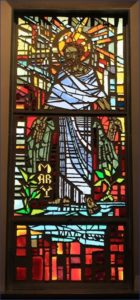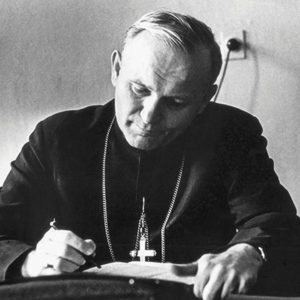 “Woman, why are you weeping?” She said to them, “They have taken my Lord, and I don’t know where they laid him.” When she had said this, she turned around and saw Jesus there, but did not know it was Jesus. Jesus said to her, “Woman, why are you weeping? Whom are you looking for?” She thought it was the gardener and said to him, “Sir, if you carried him away, tell me where you laid him, and I will take him.”
“Woman, why are you weeping?” She said to them, “They have taken my Lord, and I don’t know where they laid him.” When she had said this, she turned around and saw Jesus there, but did not know it was Jesus. Jesus said to her, “Woman, why are you weeping? Whom are you looking for?” She thought it was the gardener and said to him, “Sir, if you carried him away, tell me where you laid him, and I will take him.”  Jesus said to her, “Mary!” She turned and said to him in Hebrew, “Rabbouni.” (John 20:13-16)
Jesus said to her, “Mary!” She turned and said to him in Hebrew, “Rabbouni.” (John 20:13-16)
This beautiful scene of Jesus and St. Mary Magdalene, the Apostle to the Apostles, is portrayed in the stained-glass windows at the front of Magdalen’s Our Lady Queen of Apostles Chapel. Jesus called Mary Magdalene by name, and she was the first person to recognize the risen Christ. As our patroness, her life inspires us to be attentive to our callings and to see all things in light of the resurrection.
Every July 22nd our college celebrates the Feast of St. Mary Magdalene with a special Mass followed by a solemn procession to her life-size statue at our campus entrance. St. Mary Magdalene, pray for us!
 Along with St. Mary Magdalene, St. John Paul II is the co-patron of Magdalen College. We seek his intercession daily. His personal interests and goals fit with our mission in a fascinating way.
Along with St. Mary Magdalene, St. John Paul II is the co-patron of Magdalen College. We seek his intercession daily. His personal interests and goals fit with our mission in a fascinating way.
Magdalen exudes a culture that is dedicated to learning—a culture of “setting out into the deep” (one of St. John Paul II’s well-known phrases)—by engaging the biggest questions of life. In addition to a culture that loves learning and going deep, Magdalen also embodies a culture of beauty and reverence.
As a young priest, Karol Wojtyla experienced a powerful sort of fellowship with a group of about 20 young people who called themselves the “little family.” May our students be emersed in a fellowship of prayer and conversation that equips them for faithful living in a turbulent world. Pope St. John Paul II, pray for us!
Students will have the opportunity to take one of the following courses for college credit. Taught in Socratic-style seminar discussions, each course enables students to explore a particular interest and consider whether they might like to pursue that academic discipline as a potential college major. Students will spend 3.5-4 hours in class each day, have some assigned homework, and spend the remaining time in prayer, liturgy, sacred music, relaxation with new friends, and a wide range of extra-curricular activities.
Theology of the Body: The Deeper Meaning of Love, Sex, and Marriage (1 credit) – Dr. Ryan Messmore
THIS COURSE IS NOW FULL
When it comes to romantic relationships and marriage, today’s culture is awash in confusion. The Church calls people to see a deeper meaning to sexual desire and marriage. But what is that, and how can it be pursued in modern times? Saint Pope John Paul II has provided valuable teaching in this area. Along with his “Theology of the Body,” this course will explore the nature of love, the meaning of betrothal and marriage, and sexual ethics from a Christian perspective. Class discussions will be theological and philosophical as well as practical.
Philosophy & Humanities: Friendship in Western Culture (1 credit) – Dr. Brian FitzGerald and Dr. Erik Van Versendaal
THIS COURSE IS NOW FULL
One of the most important features of human experience is friendship. Drawing on the great books of Western culture in literature, history, philosophy, and theology, from Aristotle and St. Augustine to Jane Austen and C.S. Lewis, this course will reflect on the nature of friendship across the centuries. Why do we need friends? What makes a good one? What are some obstacles to friendship? What happens as friends grow and mature in different ways?
Christ in Scripture (1 credit) – Deacon Karl Cooper
THIS COURSE IS NOW FULL
“Did not our hearts burn within us while he talked with us on the road, while he opened to us the Scriptures?” In this course we will seek to meet and understand Christ as he presents himself in all the Scriptures. We will read, discuss, enjoy, and pray through the most crucial texts, and focus our work on the living and present Christ.
$395.00 USD
Tuition includes room and board. The purchase of a book may be required for some classes. Students should bring spending money for off-campus trips.
Students will have the opportunity to take one of the following courses for college credit. Taught in Socratic-style seminar discussions, each course enables students to explore a particular interest and consider whether they might like to pursue that academic discipline as a potential college major. Students will spend 3.5-4 hours in class each day, have some assigned homework, and spend the remaining time in prayer, liturgy, sacred music, relaxation with new friends, and a wide range of extra-curricular activities.
Physics: Understanding Boomerangs, Billiard Balls, and Balance Beam Routines (1 credit) – Mr. John Klucinec
THIS COURSE IS NOW FULL
This course explores the laws of motion as described by Galileo and Newton by reading and discussing these authors and through classroom experiments. Students will gain an understanding of physics in concrete phenomena through studying air flight, fluid dynamics, the aerodynamics of the boomerang, the motion of billiard balls, and the physics of gymnastics and diving.
Poetry and Politics in the Western Tradition (1 credit) – Dr. Mary Mumbach
THIS COURSE IS NOW FULL
This course will examine poetic form and political form in the tradition of the West. Students will explore, in particular, how the Incarnation shapes the roles of imagination, prudence, and the heroic in literature and political philosophy. Readings in poetry, fiction, and American Founding documents will be considered.
Moral Philosophy: How Do We Make the Right Decisions? (1 credit) – Rev. Fr. Stephen Rocker
THIS COURSE IS NOW FULL
Natural law morality and utilitarianism are incompatible frameworks of moral reasoning, yet elements of both are mixed in the public mind. Catholic moral teaching and the Western system of law are grounded in natural law. This course will present these two moral frameworks and apply them to moral issues.
$395.00 USD
Tuition includes room and board. The purchase of a book may be required for some classes. Students should bring spending money for off-campus trips.
